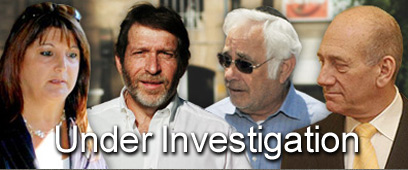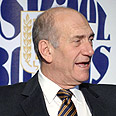

"Citizens of Israel, I look you in the eye and I say to you, in no uncertain terms, I have never taken a bribe, nor have I unlawfully pocketed money," said Prime Minister Ehud Olmert Thursday. "If Attorney General Menachem Mazuz decides to file an indictment against me I shall resign immediately, even though I am not required to do so by law."
Olmert convened an impromptu press conference in Jerusalem Thursday night, following the Tel Aviv Magistrates Court's decision to revise the comprehensive gag order places on the investigation against him.
The decision was made after a lengthy meeting held by the Justice Ministry on the matter, Thursday evening. The session was attended by Attorney General Menachem Mazuz, State Prosecutor Moshe Lador, Jerusalem District Prosecutor Eli Abarbanel, Head of Police Investigations and Intelligence Commander Yohanan Danino, Commander Yoav Segalovitz and head of the National Fraud Unit, Brigadier-General Shlomi Ayalon.
The meeting ended with the police agreeing to revise the order, all while still voicing its reluctance to have details of the investigation made public.
The court further allowed publication of the following details: Attorney General Menachem Mazuz ordered the police to launch a new, urgent investigation against the prime minister and several other persons of interest, on suspicions of unlawfully receiving funds during the time preceding his premiership, when he was the mayor of Jerusalem and the trade, labor and industry minister.
Law enforcement officials defined the allegations as "bribery": Olmert is believed to have allegedly received payments over a lengthy period of time, both directly and indirectly. The funds were said to amount to a small fortune. The investigation is expected to take weeks, at best.
The witness
The court also allowed publication of that name of the foreign national implicated in the case - Moshe Talansky.
Olmert's investigation was placed under a comprehensive gag order since its induction, but on Wednesday the Jerusalem District Court allowed the media to report that a material witness order has been issued in the case, in order to depose a foreign national – Talansky – prior to any decision on an indictment.
Talansky was questioned as part of a different case. That investigation resulted in leads which later materialized into the suspicions being investigated at this time.
"Tonight, after the gag order had been revised, I stand here before you as Israel’s prime minister to present you with the facts as they are," said Olmert at the press conference.
"Political campaigns cost money. The legislator acknowledges that, allowing one to raise funds. There was nothing wrong with the contribution funds raised on my behalf. The matter was handled by Attorney Uri Messer."
Olmert went on to recount his relationship with Talansky, detailing how he helped raise money for his 1998 campaign for the mayorship of Jerusalem, and the 1999 and 2000 Likud primaries.
"I have no doubt Messer managed the funds according to the letter of the law and that all funds were put towards elections and covering election deficits," said Olmert.
"I was chosen to lead this country and I have no intention of stepping down, but if Attorney General Menachem Mazuz decides to file an indictment against me I shall resign immediately, even though I am not required to do so by law.
"We are in the midst of a process critical to Israel’s future and security. I have been serving the Israeli public in various roles for over 30 years… I regret the hardship imposed on the public, on my associates and my family. I hope this storm too shall pass," he concluded. Olmert refused to take any questions from reporters.
Tangled web
Prime Minister Olmert was questioned by the National Fraud Unit a week ago, for one hour, at his Jerusalem home and cooperated with the police in full. He denied ever receiving any funds illegally.
The Justice Ministry and the police issued a statement Thursday, saying a comprehensive gag order was placed on the investigation in order to protect its integrity.
Revealing the details of the investigation in its early stages, said the statement, might have compromised the police's ability to conduct an effective investigation, thus hindering it goal of getting to the truth.
Nevertheless, a source in law enforcement told Ynet that since the onset of the investigation, the public's right to know about an ongoing investigation against the prime minister had always been factored in, along with the possible risk for abstraction of justice, should the probe be made public prematurely.
The State maintained that the possible harm to the integrity of the investigation outweighed the public right to know. The court initially accepted the State's argument, ordering a full gag order and denying several petitions filed by media outlets to crush it.
Following the conclusion of the first stage in the investigation, which took 10 days and included the police questioning Former Prime Minister's Office Bureau Chief Shula Zaken and attorney Uri Messer, both the police and Justice Ministry officials reassessed the situation, reaching the conclusion that the gag order can be revised.















